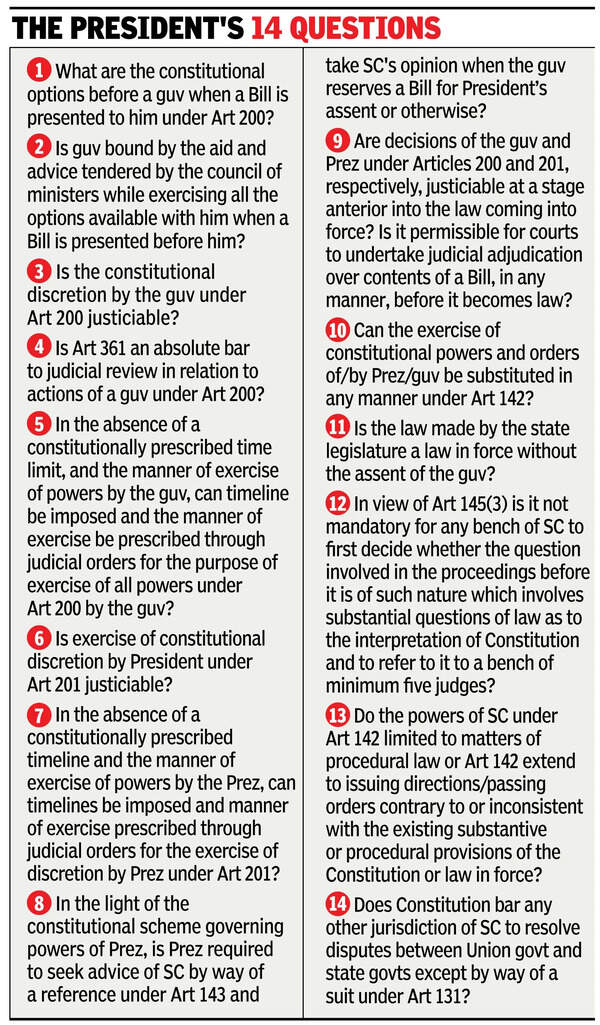Can SC set a time limit for the President, agreed to the Governor’s bills?: Murmu | Bharat News

New Delhi: In a sharp response to the Supreme Court’s decision of April 8, the Tamil Nadu Government vs. Governor for the Governor and the President set a deadline to take a time limit on the state bills in the Governor case, President Draupadi Murmu on Wednesday asked the Apex court how it could give such a decision when there was no stupulation in the constitution.It is aware that a petition reviewing the 415-foot decision by Justices JB Pardwala and R. Mahadevan will not give positive results as it is clearly considered by the same bench in the chamber, Union Gowat rarely used the President’s powers under Article 143 (1) of the Constitution for a Miriad content for a miriad material. In particular, the President sought the SC’s view on 14 questions.

14 questions of president
Prez: Recognized concept Foreign for constitutional planThe President said that the articles applied to the governors and the President respectively, 200 and 201, “do not determine any time limit or process” should be chased by them, refusing to give consent for a grant or bill passed by the assembly.“Articles 200 and 201 under the Constitution, the exercise of constitutional discretion by the Governor and the President respectively, respectively, is essentially governed by polycentric ideas, including federalism, uniformity of laws, uniformity, integrity and principles of separation of powers,” He said that he was in the form of Article 143 (1), which was in the form Were changed. President’s assurance for bills,Article 200 to the 200 Governor, the presentation of a bill passed by an assembly, or to return the bill as soon as possible, to return the bill, for reconsideration by the House, except for money bills, returns the bill. This provision also suggests that the governor is sent to “then” when he rethinks the bill.However, when a governor reserves a bill for the idea of the President, it is mandatory to declare it under Article 201 whether he assures or withdraws it. The Constitution, however, does not set a time limit for the President to take a special action once, after rethinking by the assembly, it is presented to re -accept it.Without any express provision in the constitution, Justice Pardwala and Mahadan’s bench had set a three -month time limit for the governor to either return the house or return the bill.If the bill is re -passed by the House and gets angry with it, the Governor should agree within a month, SC had ruled. It had also set a three -month deadline to decide whether to accept or reject a bill.SC’s critical using its Article 142 powers to rule that 10 bills pending with the Tamil Nadu Governor will be considered, the President said, “The concept of a consent of the President and the Governor is foreigner to the constitutional plan and originally crosses the President and the Governor’s powers”.The President also questioned the argument behind the SC’s decision, which suggested that it would be better if the President wants the opinion of the apex court in the past whether the bills reserved for them by the governors have to agree.He said that SC needs to give his opinion and the contour and realm of provisions contained in Article 142 (which gives Omnibus power to perform full justice) “in the context of issues (consenting bills), which are occupied by constitutional provisions or statutory provisions.In addition, instead of Article 32 (which is to remove violations of the fundamental rights of citizens), rapidly questioned using SC’s writ jurisdiction, instead of Article 131 (to be postponed by SC only by SC), to postpone the issues “which includes the interpretation of the Constitution.”




